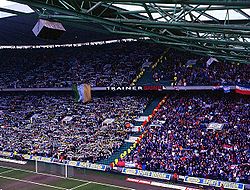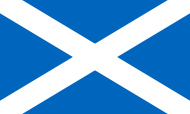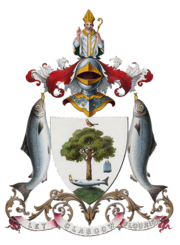Old Firm
 Fans kept apart at a match between the clubs |
|
| City or region | Glasgow, Scotland |
|---|---|
| First contested | 28 May 1888 |
| Teams involved | Celtic and Rangers |
The Old Firm is a common collective name for the association football clubs Celtic and Rangers, both based in Glasgow, Scotland.
The origin of the term is unclear. One theory has it that the expression derives from Celtic's first game in 1888, which was played against Rangers. A newspaper report stated that both sets of players "got on so well that you would believe that they were old firm friends." However, William J. Murray states that the term derives from the commercial benefits of the two clubs' rivalry, which were viewed with distaste in some quarters in the early days of the game.[1]
Another theory is that the term "The Old Firm " occurred during the early 20th century when the two clubs began to dominate the Scottish football competitions.
The two clubs are the most successful in Scotland, having won between them 67 Scottish Cups and 95 Scottish League championships (as of May 2010). Interruptions to their ascendancy have occurred infrequently, most recently with the challenge of the New Firm of Aberdeen and Dundee United in the first half of the 1980s and other times happening in the 1890s and 1950s. Starting with the 1995–96 season, the Old Firm clubs finished in the top two places in every season until 2005–06, when Heart of Midlothian finished second ahead of Rangers. As of 4 May 2010, Rangers and Celtic had played each other 388 times, with Rangers winning 155 matches, Celtic 140 matches and 93 draws.[2] The two clubs normally compete four times a year in the SPL and are regularly drawn against each other in the two Scottish cup competitions.
The clubs have large support bases around Glasgow, but also have supporters clubs in most towns throughout Scotland and in many cities around the world. The presence of Rangers and Celtic has been estimated to be worth £120 million to the Scottish economy.[3]
Contents |
Rivalry and sectarianism
The competition between the two clubs has roots in more than just a simple sporting rivalry. It is infused with a series of complex disputes, sometimes centred on religion (Catholic and Protestant) and Northern Ireland-related politics (Loyalist and Republican). Rangers' traditional support was largely, but by no means exclusively, from the Protestant community, while Celtic's was mostly, but by no means exclusively, from those of Irish extraction. One effect is that Scottish flags are rare among Celtic supporters; Celtic fans are more likely to wave the Irish tricolour while Rangers fans tend to wave the Union Flag
The ferocity of the rivalry has made it rare for a player to represent both teams during his career. Players who have played for both sides of the Old Firm include Alex Bennett, Scott Duncan, Robert Campbell, George Livingstone - these players played before the intensity of the rivalry had started/before 1912 - Alfie Conn, Maurice Johnston, Kenny Miller, Steven Pressley and Mark Brown.
In 1980, fans fought an on-pitch battle in the aftermath of Celtic's 1–0 victory in the Scottish Cup Final at Hampden. This remains the worst invasion onto a football pitch ever reported.[4] There was serious fan disorder during an Old Firm match played in May 1999 at Celtic Park. A missile was thrown from a Celtic section of the ground and struck referee Hugh Dallas, forcing the game to be stopped while he received medical treatment.[5] At least four Celtic fans invaded the field of play to confront Dallas during the game,[5] and more missiles were thrown at players on the pitch after the game.[5]
The Old Firm rivalry fuels many assaults on Old Firm Derby days, and some deaths in the past have been directly related to the aftermath of Old Firm matches. An activist group that monitors sectarian activity in Glasgow has reported that on Old Firm weekends, admissions to hospital emergency rooms increase ninefold over normal levels.
Head to head record
| Competition | Played | Rangers | Draw | Celtic |
|---|---|---|---|---|
| Scottish League | 295 | 116 | 83 | 97 |
| Scottish Cup | 46 | 16 | 8 | 22 |
| League Cup | 46 | 23 | 2 | 21 |
| Totals | 388 | 155 | 93 | 140 |
Note: League championship statistics include play-off match for the 1904–05 title which Celtic won 2–1.
1888–1999 statistics obtained from RSSSF. Remaining stats obtained from Soccerbase
Players who played for both clubs
Transfers between both Old Firm clubs are rare, only seven in over 110 years. Players have joined both clubs throughout their career but only two players have played for a club more than once, Tom Dunbar and Kenny Miller.[6]
 Tom Dunbar (Celtic 1888-1891, Rangers 1891-1892, Celtic 1892-1898)
Tom Dunbar (Celtic 1888-1891, Rangers 1891-1892, Celtic 1892-1898) Allan Martin (Rangers 1891-1892, Celtic 1895-1896)
Allan Martin (Rangers 1891-1892, Celtic 1895-1896) George Livingstone (Celtic 1901-1902, Rangers 1906-1909)
George Livingstone (Celtic 1901-1902, Rangers 1906-1909) Alex Bennett (Celtic 1903-1908, Rangers 1908-1918)
Alex Bennett (Celtic 1903-1908, Rangers 1908-1918) Tom Sinclair (Rangers 1904-1906, Celtic 1906-1907)
Tom Sinclair (Rangers 1904-1906, Celtic 1906-1907) Robert Campbell (Celtic 1905-1906, Rangers 1906-1914)
Robert Campbell (Celtic 1905-1906, Rangers 1906-1914) Hugh Shaw (Rangers 1905-1906, Celtic 1906-1907)
Hugh Shaw (Rangers 1905-1906, Celtic 1906-1907) Willie Kivlichan (Rangers 1905-1907, Celtic 1907-1911)
Willie Kivlichan (Rangers 1905-1907, Celtic 1907-1911) David Taylor (Rangers 1906-1911, Celtic 1918-1919 wartime guest)
David Taylor (Rangers 1906-1911, Celtic 1918-1919 wartime guest) Davie McLean (Celtic 1907-1909, Rangers 1918-1919)
Davie McLean (Celtic 1907-1909, Rangers 1918-1919) Scott Duncan (Rangers 1913-1918, Celtic 1918-1919 wartime guest)
Scott Duncan (Rangers 1913-1918, Celtic 1918-1919 wartime guest) James Young (Celtic 1917-1918, Rangers 1917-1918)
James Young (Celtic 1917-1918, Rangers 1917-1918) Tully Craig (Celtic 1919-1922, Rangers 1923-1935)
Tully Craig (Celtic 1919-1922, Rangers 1923-1935) Alfie Conn (Rangers 1968-1974, Celtic 1977-1979)
Alfie Conn (Rangers 1968-1974, Celtic 1977-1979) Maurice Johnston (Celtic 1984-1987, Rangers 1989-1992)
Maurice Johnston (Celtic 1984-1987, Rangers 1989-1992) Steven Pressley (Rangers 1990-1994, Celtic 2006-2008)
Steven Pressley (Rangers 1990-1994, Celtic 2006-2008) Mark Brown (Rangers 1999-2001, Celtic 2007-2010)
Mark Brown (Rangers 1999-2001, Celtic 2007-2010) Kenny Miller (Rangers 2000-2001, Celtic 2006-2007, Rangers 2008–present)
Kenny Miller (Rangers 2000-2001, Celtic 2006-2007, Rangers 2008–present)
See also
- Culture in Glasgow
- Ethnicity and football
- Football (soccer) culture
- Local derby
- Major football rivalries
- Sectarianism in Glasgow
- Sport in Scotland
- Timeline of Glasgow history
Footnotes
- ↑ Murray, William J. (1984). The Old Firm: sectarianism, sport, and society in Scotland. Edinburgh: J. Donald Publishers; Atlantic Highlands, N.J.. ISBN 0-85976-121-5.
- ↑ "Old Firm". Rangers official website. 5 September 2006. http://www.rangers.premiumtv.co.uk/page/oldfirm/0,,5,00.html.
- ↑ "Old Firm on the ball for economy". BBC Sport. 29 June 2005. http://news.bbc.co.uk/1/hi/scotland/4635535.stm. Retrieved 29 June 2005.
- ↑ McCarra, Kevin (18 May 2009). "Firm enemies – Rangers and Celtic, 1909–2009". London: Guardian. http://www.guardian.co.uk/football/2009/may/18/seven-deadly-sins-rangers-celtic-wrath. Retrieved 28 January 2010.
- ↑ 5.0 5.1 5.2 "Scottish Premier | Rangers make history out of chaos". BBC News. 1999-05-03. http://news.bbc.co.uk/1/hi/sport/football/scottish_premier/334094.stm. Retrieved 2010-08-16.
- ↑ "Players who played for both Celtic and Rangers in their career". http://www.scottishleague.net/archive/archive120.htm.
Further reading
- Bradley, Joseph M. (2006-11-20). "The Patriot Game: Football's Famous `Tartan Army'". International Review for the Sociology of Sport (International Sociology of Sport Association and SAGE Publications) 37 (2): 177–197. doi:10.1177/1012690202037002004.
- Burdsey, Daniel; Chappell, Robert (2006-11-20). "‘And If You Know Your History ‘. An Examination of the Formation of Football Clubs in Scotland and their Role in the Construction of Social Identity" (PDF). The Sports Historian 21 (1): 94–106. http://www.aafla.org/SportsLibrary/SportsHistorian/2001/sh211g.pdf.
- Foer, Franklin (2004). "How Soccer Explains the Pornography of Sects". How Soccer Explains the World: An Unlikely Theory of Globalization. New York: HarperCollins. pp. 35–64. ISBN 0-06-621234-0.
- McMenemy, David; Poulter, Alan (2006-11-20). "An Identity of Two Halves? Celtic Supporters, Identity, and Scottish Society". Irish Studies Review (Routledge) 13 (2): 139–150. doi:10.1080/09670880500060749. http://taylorandfrancis.metapress.com/openurl.asp?genre=article&issn=0967-0882&volume=13&issue=2&spage=139.
- Murray, William J. (1984). The Old Firm: sectarianism, sport, and society in Scotland. Edinburgh: J. Donald Publishers, Atlantic Highlands, N.J.. ISBN 0-85976-121-5.
- Murray, William J. (1988). Glasgow's giants: 100 years of the Old Firm. Edinburgh: Mainstream. ISBN 1-85158-111-1.
- Murray, William J. (1998). The Old Firm in the new age: Celtic and Rangers since the Souness revolution. Edinburgh: Mainstream. ISBN 1-85158-984-8.
- Murray, William J. (2003). Bhoys, bears and bigotry: the Old Firm in the new age. Edinburgh: Mainstream. ISBN 1-84018-810-3.
External links
- Head-to-head results from Soccerbase
- The Old Firm, The Scotsman
- "possibility of a religious blessing being treated as a criminal offence", Sunday Herald, 27 August 2006
|
||||||||||||||||||||||||||
|
|||||||||||||||||||||||||||||
|
|||||
|
|||||||||||||||||||||||||||||||
